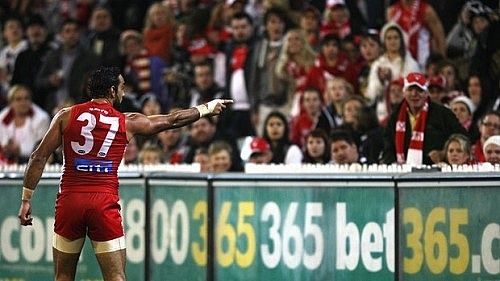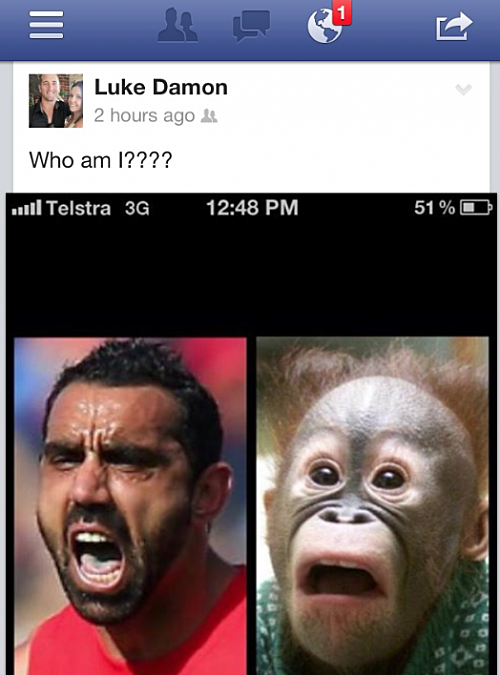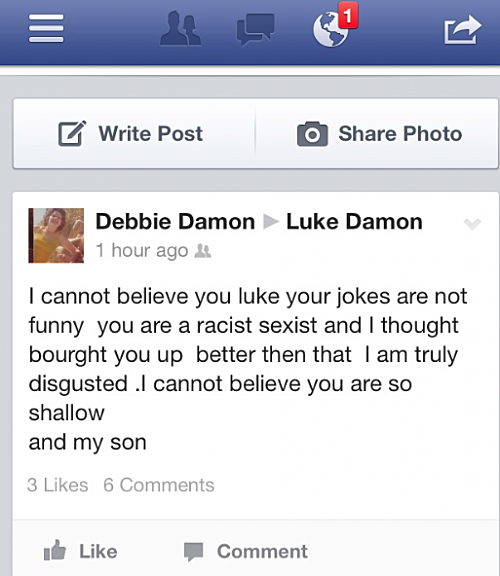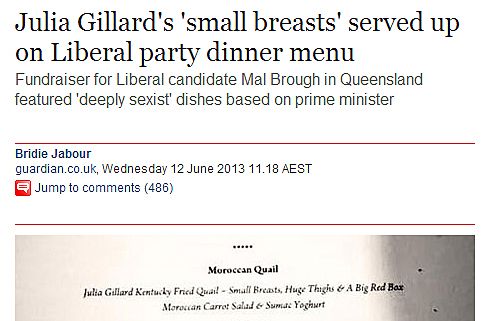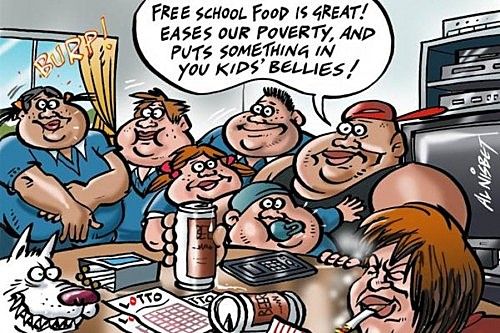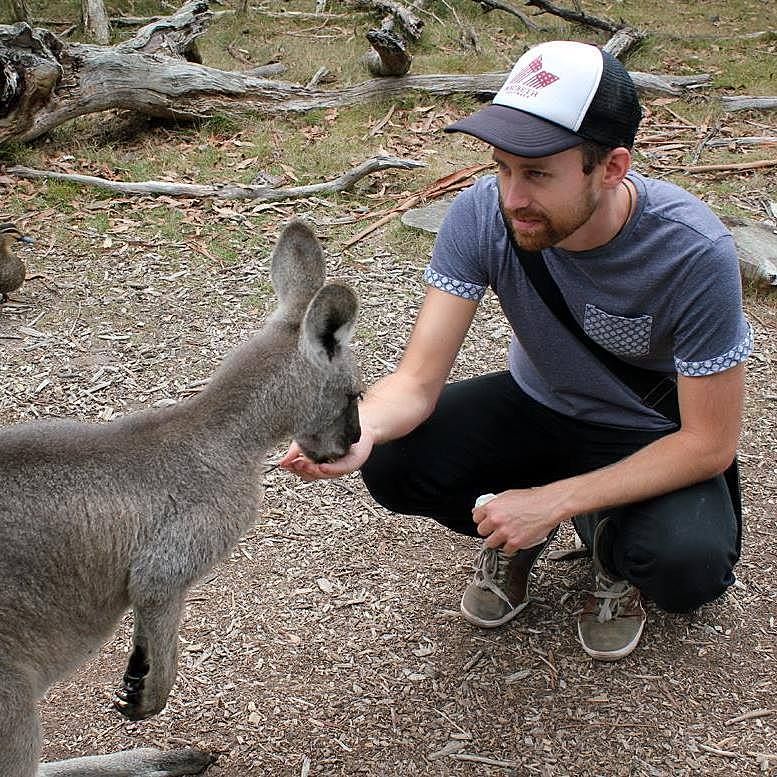Aping Intolerance
What happens when Australians post hate-speech online rather than shouting it at the footy? They begin to figure out what intolerance feels like, writes Matt Harnett.
On 24 May, the Sydney Swans smashed the Collingwood Magpies at the MCG, winning by 47 points in an historic blow out. The game was part of the Indigenous Round, when the Australian Football League recognises the contribution Indigenous Australian players have made to the game and its culture. It was therefore unthinkable that a 13 year-old Collingwood fan sitting near the pitch should single out Adam Goodes, a Sydney player of Indigenous descent who was having the game of his life, and yell “Ape!”
Goodes had his back to the girl. “When I turned around, I just saw this young face and I was just, it was just sad…” He stood stock still for a moment, then pointed at her. “It just hit me, that's why I had to leave the arena, it just broke my heart.” He retired before full time to the team’s changing rooms. He’d never in his career played so well. He was a grown man, but a 13 year-old girl had looked at him and in a moment of rabid thoughtlessness screamed something hateful, and he was done. The girl was kicked out of the stadium, and subsequently apologised. You can’t say that sort of thing in public and expect to get away with it, not anymore.
Goodes gave an excellent press conference the next day, explaining his reaction and why he had to leave the field. “I felt I was in high school again, being bullied, being called all these names because of my appearance. I didn't stand up for myself in high school. I'm a lot more confident, I'm a lot more proud about who I am and my culture, and I decided to stand up last night.” An Australian website posted an interesting etymology of the insult.
And in the mainstream media, that was the end of that.
Like Adam Goodes, Luke Damon is a keen footy player. He’s not quite in the same class: he plays for a little local club, the Chelsea Seagulls. They’re based on the Mornington Peninsula, south of Melbourne. He works for a company called Ja & Ja Concreting, and went to Mt Erin Secondary College. He’s got blue eyes and an attractive partner. A dog, too – a beautiful chocolate Labrador.
I know all this because Luke doesn’t know how to use Facebook.
Should we give Luke the benefit of the doubt? Does his ‘Who am I????’ belie legitimate existential angst, or even self-loathing? I suspect it does not. My suspicion was shared by Luke’s mum, a woman of striking sense and punctuation:
I’m not sure how long Luke kept the post up before some neurons fired and he deleted it or someone reported it, but it’s gone now. Gone from Facebook, anyway. Unfortunately for Luke, the internet doesn’t forget. I didn’t catch wind of his galling racism by feverishly refreshing his entirely-open Facebook profile in hope of documenting some indiscretion; I saw it on the antibogan.
The antibogan is an Australian website that shames people who promulgate racist, sexist or homophobic points of view on social media. It’s also a platform for occasional writing on race and gender in Australian society, and often features commentary after particularly ugly incidents. They usually manage to post something new every day or two – pretty good for a team of six with other jobs.
Much of the website’s content feels deliberately incisive and confrontational, at odds with the typical liberal impulse to pause and engage in a quiet, meaningful dialogue with political incorrectness. Sometimes it feels nasty – a sense of righteous outrage more usually attributed to the right of the political spectrum. You get an impression that the people who run the site are genuinely angry at some of the things that are broadcast online, a feeling of seething frustration that people could be so stupid. It shares these characteristics with another site I follow, the American STFU Conservatives, but it’s much more explicit in the naming of those it says “abuse Aussie freedom of speech.” As you can see in its story on Luke Damon, it even tracked down a news article about him, and suggested outraged readers get in contact with his employers and footy club.
I like their moxie. A lot.
I asked one of the site’s admins, Ed, a few questions via email. I was especially interested in their filtering process – do they ever decide to take things down after they’ve been posted?
“Not usually. We have no obligation to remove a post but generally do if the person has shown remorse or apologised. There was a guy who posted some disgusting racist rants recently that allegedly had a mild form of Aspergers. Even though the claim has not been confirmed, we still felt it necessary to remove that post in respect to the legitimately mentally disabled.”
Similarly, if that girl had written her slur instead of shouting it, she wouldn’t have been featured on the site: “Minors are out and if there are minors in photos of people that we obtain, we blur them out. Other than that – anything goes. If a person is pictured (publicly) with a partner and we obtain that photograph, we don't usually blur the partner out. We believe that the offending person needs to do some explaining to all parties involved and consequently hurt.”
I wondered though whether the site might have an opposite effect than the one intended – that racists or homophobes or whoever would see other people like themselves appearing on the antibogan, realise that their point of view was shared by others, and feel encouraged. An echo-chamber that accidentally legitimised hate speech, effectively. Ed’s answer surprised me: “Yeah, that's a problem, but we all believe that the overwhelming majority of society are completely against it.”
The antibogan works on a centrally optimistic principle, even if that’s sometimes hard to see past the screeds of wearying, rote viciousness. It works because it realises the people who mount these attacks already feel a sense of comfortable entitlement, feel like they’re coming from a position where people mainly agree with them, and so see nothing wrong with saying what everyone’s thinking. Their self-conceived privileged centre gets quickly marginalized when it’s scrutinized by a group outside their regular associates: the general public. Ed doesn’t have to change the mind of every shithead on the internet; he simply has to rely on a fundamentally decent society being fair-minded enough to object to them.
As he says, “Our website doesn't exist to stamp out racism – it exists to highlight its appalling and ignorant nature. It also exists so that when employers, family members and partners Google search these idiots, our site is one of the top hits.”
Maybe it’s tempting to cry foul on the how the antibogan obtains its material. “People are messaging us and writing on the wall all the time… people are constantly sending emails with screenshots and links.” Friends of friends, people like Luke with wide-open profiles: fair game. One of the admins “looks after content passed on via Twitter and the rest monitor Facebook and infiltrate bigoted groups and pages, screenshotting as they go.”
Imagine if you wrote something meant for a small circle of friends, and the next day found yourself at the centre of a campaign of vilification, with calls being made to your employer. That’s bullshit, of course, but it reveals a cognitive dissonance we tend to carry around – somehow yelling ‘ape!’ in a crowd is a contemptible offence, but being called out for telling the whole world a racist joke is creepy and invasive. Though the forum differs, the intentionality behind the act is the same. Complaints that the site exploits people unfamiliar with social media’s privacy settings miss the point. It’s as if a man were unable to control the volume of his voice, and accidentally screamed a sexist insult at a woman walking down the street, rather than muttering it under his breath as he’d intended. We wouldn’t sympathise with his modulation issues, we’d rightly condemn him for being a sexist prick in the first place.
Ed obviously agrees. “People who harbour these thoughts and intend on broadcasting these views to even 10 people deserve to be shamed. Fair enough – some people harbour hatred and resentment, but when such hatred and resentment is irrational and unfounded – and then made public – they need to feel the consequences. We don't phone tap private conversations or write fabricated stories, we just republish what has been made public.”
Not everyone sees it that way, least of all the people who find their faces and phone numbers on a website visited by thousands weekly. “I personally haven't received any threats, nor have the majority of the current admin team. But several of the previous operators copped a lot from the fanatical right wingers. Death threats, phone calls, publishing of private details and photos of family members/partners.”
The last thing I asked Ed was if he could ever see himself giving up the project entirely – if the unceasing tide of hate speech might eventually render him fatalistically inert, as the sea slowly wears down stones. “Of course,” he replied. “None of us are overwhelmingly satisfied with what progress we make with the site. It is a necessary service though, and until any of us comes up with anything better, it will push on.”
I’ve talked to a few (white) friends in Melbourne, and they’re not shy about labelling their country racist. They’ll readily admit that some of their fellows harbour deep and nasty resentments against minorities, but they’ll usually also insist that the people espousing these views live elsewhere – up north, or in the country, or rural towns. They’ll name entire states ‘especially bad’ offenders, and possibly list a few structural inequalities that prevent Indigenous Australians, say, from equal participation in society. But that 13 year old girl was shouting from Melbourne, Victoria, and so was Luke Damon. Like charity, racism begins at home. We’re quick to malign Australia as a land of xenophobes, but then we publish things like this in our newspapers and our Race Relations Commissioner says there’s nothing racist about it:
Perhaps the antibogan’s not the perfect solution to combating online hate speech, but it’s a start. Every redacted status or deleted tweet is one fewer reason for a potentially vulnerable person to feel unsafe or discriminated against on the internet. Shame’s a powerful weapon.
I wondered recently if Nisbet were to republish his cartoons via social media, whether the antibogan might devote a post to him. After all, you can’t say that sort of thing on Facebook and expect to get away with it – not anymore.

